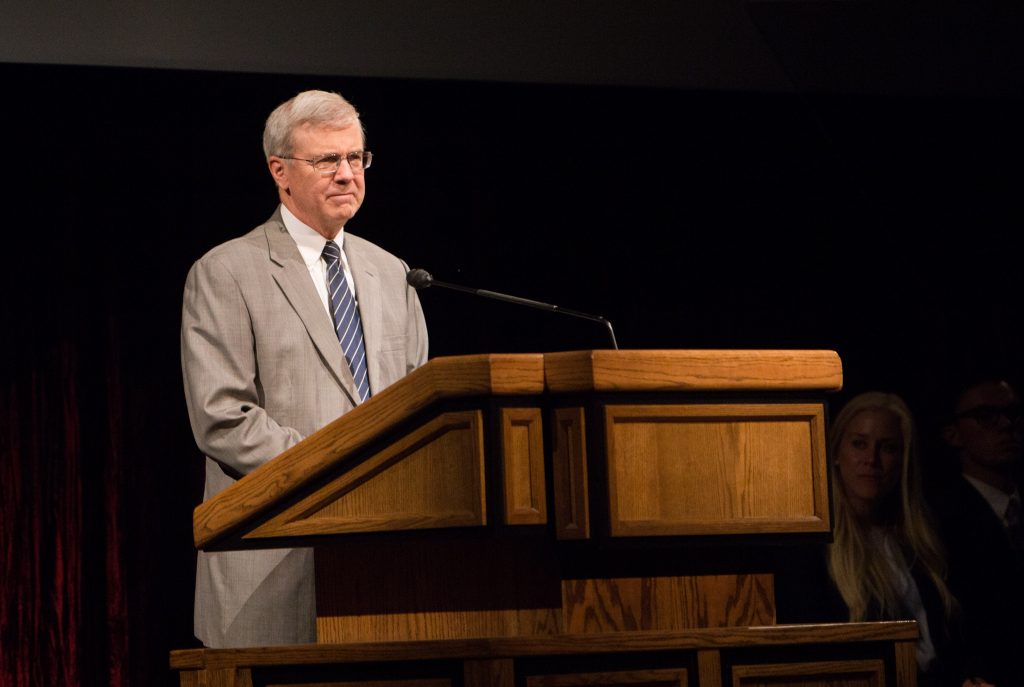
Alan Harker, Associate Academic Vice President for research and graduate studies at BYU, told students during his devotional address about the surprising death of a grandson in order to convey a message of hope and of anchoring ourselves when the “storms” come.
Harker began his talk by sharing the scripture found in Hebrews 6:19: “Which hope we have as an anchor for the soul, both sure and steadfast … ”
He explained how he has always been curious about hope and anchors and how they relate to our spirituality and progression.
“I wish to dismiss rather quickly two worldly notions regarding both hope and anchors. Hope in the scriptural sense is not wishing,” Harker said. “We use the word far too often in that shallow context and thereby confuse ourselves into believing that hope is a transitory state which can be achieved in time of distress through mere desire or anxious longing. This is not the hope that is both sure and steadfast.”
Harker also said anchors should not be looked at as objects to slow us down or hold us back, but rather they are used to keep objects stationary.
In October of 2000 the Harkers were living in Christchurch, New Zealand, where they experienced one of New Zealand’s fatal storms. The damage was severe, the worst happening at Lyttelton Harbour and leaving the marina almost destroyed.
Harker said the ships that survived the storm were those that left the shelter of harbor, went out to sea and dropped their anchors.
“In the storms that will descend on our seemingly safe harbor of home, family, church and career, real hope grants us stability, affirms our orientation and allows us to steer through those troubled waters with measured progress,” Harker said.
He then asked, “So where do I procure these anchors against the storms of life?”
Harker answers this question by basing the rest of his remarks around Romans 5:1-5 which he says is the process by which individuals can acquire hope.
- Therefore being justified by faith, we have peace with God through our Lord Jesus Christ:
- By whom also we have access by faith into this grace wherein we stand, and rejoice in hope of the glory of God.
- And not only so, but we glory in tribulations also: knowing that tribulation worketh patience;
- And patience, experience; and experience, hope:
- And hope maketh not ashamed; because the love of God is shed abroad in our hearts by the Holy Ghost which is given unto us.
“When confronted with tribulations and trial we rely upon our faith to keep us in the path — to keep us in the right direction,” Harker said. “We wait patiently for the Lord’s hand to be revealed. We recognize that promises have been kept, sustained — even when the sustenance comes in a form or time that is remarkably different than we have envisioned, requested or expected.”
Harker then told the story of his grandson Jona who was born with Treacher Collins syndrome, which effects late stage cranial-facial development.
Harker assumed this syndrome would be the “storm,” but 14 months later Jonah unexpectedly passed away from a cause not related to his condition.
Jonah choked on a fruit snack and underwent every effort possible to remove it from his throat before he stopped breathing.
“In the moment I received the call from my wife that Jonah had died I sensed the coming storm,” Harker said, “the rapid drop in the barometer and the desperate need to head to sea.”
Harker’s daughter wrote about her experiences through a blog to express her grief and thoughts as she recovered from her loss. Her blog title is “In the quiet heart is hidden,” pulled from the LDS hymn, “Lord I Would Follow Thee.”
Harker read a post written by his daughter to the BYU audience.
“My daughter’s expression of desperation, grief and hope are universal … The individual circumstances will change, but we will all experience the spiritual learning cycle over and over again so we might know the good from the evil, experience joy and sorrow, sickness and health,” Harker said. “That we might seek solace in the atonement offered by our savior and redeemer.”
Harker pronounced his talk’s purpose in a powerfully closing remark.
“May we each embrace the storms in our life having faith in our experience with that one anchor sure and steadfast — even Jesus Christ our savior and redeemer,” Harker said. “This is my prayer in his sacred name. Amen.”




